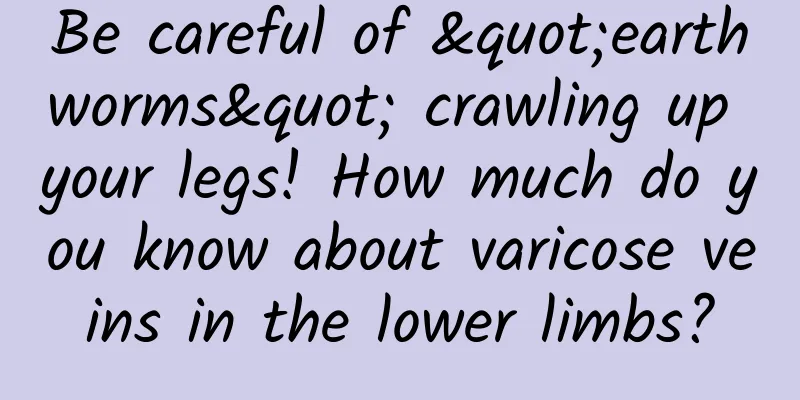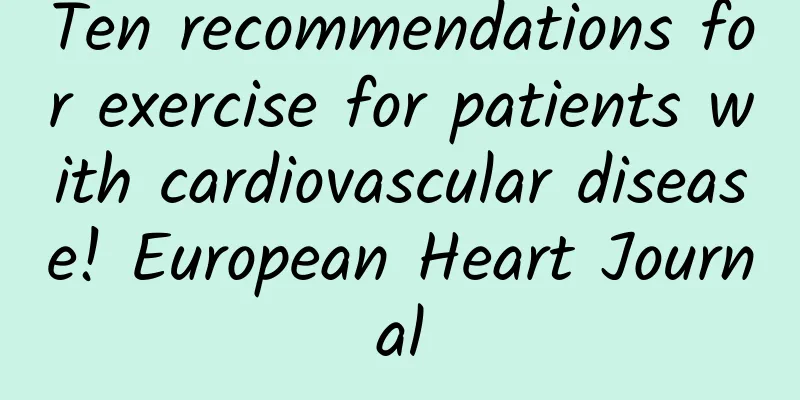Be careful of "earthworms" crawling up your legs! How much do you know about varicose veins in the lower limbs?

|
Do you experience heaviness, soreness, fatigue and pain in your lower limbs? The small veins on the legs are dilated like filaments, expanding and bending like spider webs, forming earthworm-like shapes, and lumps, which affect the appearance. In fact, these are all caused by varicose veins in the lower limbs, and in severe cases, they form lumps. The blood vessels become tortuous and dilated, and symptoms such as edema and skin itching occur. The long-term lack of oxygen in the veins leads to eczema and pigmentation, and the skin of the lower limbs suffers from nutritional disorders and ulcers. In severe cases, the ulcers may not heal for a long time, commonly known as "old rotten legs." What exactly is varicose veins in the lower limbs? Why does it require surgical treatment? Today, the Third Affiliated Hospital of University of South China will introduce you to varicose veins in the lower limbs. 1. What are the symptoms of varicose veins?1. Venous dilation The superficial veins of the lower limbs are earthworm-shaped or grape-bunch-shaped, protruding from the skin surface, bluish-purple in color, and sometimes varicose communicating branches can be seen. 2. Discomfort in lower limbs The lower limbs may experience discomfort such as heaviness, soreness, pain, itching, and cramps, which often worsens after standing or walking for a long time or after fatigue, and is relieved by resting or raising the lower limbs. 3. Edema Impaired venous return to the lower limbs causes lower limb edema, which often disappears at night or in the morning. 4. Skin changes Due to blood stasis, the skin suffers from ischemia and hypoxia, resulting in changes such as pigmentation, hardening, atrophy, and itching. 5. Ulcers It is a serious complication of varicose veins of the lower limbs, often occurring on the medial malleolus or anterior and lateral side of the calf. It is chronic, difficult to heal, and prone to secondary infection. 2. Progression of varicose veinsStage 0 - No clear signs: leg soreness, weakness, leg swelling, and easy cramps. Stage 1 - Vascular dilation stage: capillary dilation, reticular varicose veins, and spider veins. Stage 2 - Varicose vein stage: persistent dilation of the superficial subcutaneous veins without complications. Stage 3 – Edema complications stage: local skin itching. Stage 4 – Skin changes: eczema, pigmentation. Stage 5 – Healable ulcer. Stage 6 – Ulcers that do not heal. 3. High-risk groupsPeople who do heavy manual labor, teachers, nurses, pregnant women, cooks, and those who sit or stand for long periods of time are all susceptible to the disease. How to treat1. Conservative treatment Use medical elastic stockings; take intravenous active drugs as prescribed by your doctor; lose weight and avoid sitting or standing for long periods of time. 2. Surgery High ligation and stripping of the great saphenous vein: Varicose vein treatment mainly refers to high ligation of the great saphenous vein and stripping of the main trunk. A surgical incision needs to be made at the root of the great saphenous vein, and the operation is performed under general anesthesia. It is mainly suitable for situations such as thrombosis of the entire great saphenous vein trunk or thrombosis at the confluence of the great saphenous vein and femoral vein. 3. Chemoablation The intracavitary chemical ablation treatment method used for superficial varicose veins of the lower extremities mainly refers to sclerotherapy. Sclerotherapy for superficial varicose veins of the lower extremities is to inject sclerotherapy into the varicose vein cavity to destroy the venous endothelium, causing adhesion, leading to fibrosis closure, and eliminating or reducing local venous hypertension. 5. Postoperative precautions1. Elevate the affected limb After the operation, a triangular pad is used to elevate the affected limb 30°. Ankle pump exercises can be done during bed rest to promote venous return in the lower limbs and prevent deep vein thrombosis in the lower limbs. 2. Diet Do not eat spicy foods, raw or cold seafood, or greasy foods, etc. 3. Activities Patients are encouraged to get out of bed and move around early after surgery. Patients undergoing local anesthesia or day surgery can get out of bed and walk immediately after surgery. They should rest appropriately within 3 days after surgery, move around normally, and be comfortable, avoiding long-term bed rest. After surgery, your daily life will not be affected. Going up and down stairs, going for a walk, shopping, and riding in a car will not be affected if you wear the elastic stockings properly. It is recommended that you do heavy physical work and strenuous exercise at least one month after surgery. 4. Wear compression stockings Generally, elastic stockings are worn before discharge. If the varicose veins in the lower limbs are severe and there are many surgical incisions, the elastic bandage needs to be removed 48 hours after discharge and then replaced with elastic stockings. Recommended elastic stockings: Level 2 compression, long tube. After 1 month, they can be replaced with Level 1 compression, short tube. Wearing time: Wear elastic stockings all day for the first week, put on elastic stockings when you wake up in the morning after 1 week, and take them off when you rest at night; it is recommended to wear elastic stockings for at least 1 to 3 months. 5. Follow-up visit time Patients are recommended to visit the outpatient clinic for follow-up 1-2 weeks after surgery. If patients experience sudden swelling of the lower limbs, local redness, swelling, heat and pain, etc., they are advised to visit the hospital in time. Regular follow-up visits are conducted 1 month, 3-6 months, 1 year, and 2 years after surgery to check the surgical treatment of varicose veins in the lower limbs. Hunan Medical Chat Special Author: Peng Yaqiong, the Third Affiliated Hospital of University of South China Follow @湖南医聊 to get more health science information! (Edited by YT) |
Recommend
What causes acne on the labia majora?
Acne on the labia majora is a symptom of eczema, ...
Dysmenorrhea and scanty menstruation, it turns out this is the reason
Every woman will encounter various problems durin...
How to deal with ectopic pregnancy
I believe that everyone is familiar with the symp...
Dryness and pain during intercourse after childbirth
After a woman has just given birth, her urinary s...
Does a thick cervix mean slow fertility?
The cervix is an important component of the sof...
Bleeding after sex is not clean
Some female friends will experience bleeding afte...
What medicine should I take if there is a lot of leucorrhea with a strange smell?
It is abnormal if there is a lot of leucorrhea wi...
Can I use baking soda to wash my lower body?
Having a healthy body is very important for every...
VCIOM: Mobile social networking, a new force in Russian social networks
Since Facebook has not made much progress in Russ...
How to eliminate cervical fatigue when you often look down at your phone or computer?
With the change of lifestyle, people have become ...
What to do if you get chickenpox during breastfeeding
As we all know, chickenpox is highly contagious a...
Brown discharge not during menstruation
Menstruation is something that every woman must g...
Can women with polyovarian syndrome have children?
Nowadays, more and more couples are unable to hav...
Can pregnant women drink middle-aged and elderly milk powder?
In fact, it is best for pregnant women not to dri...
When do pregnancy spots appear?
Stretch marks are a concern for most women when t...









